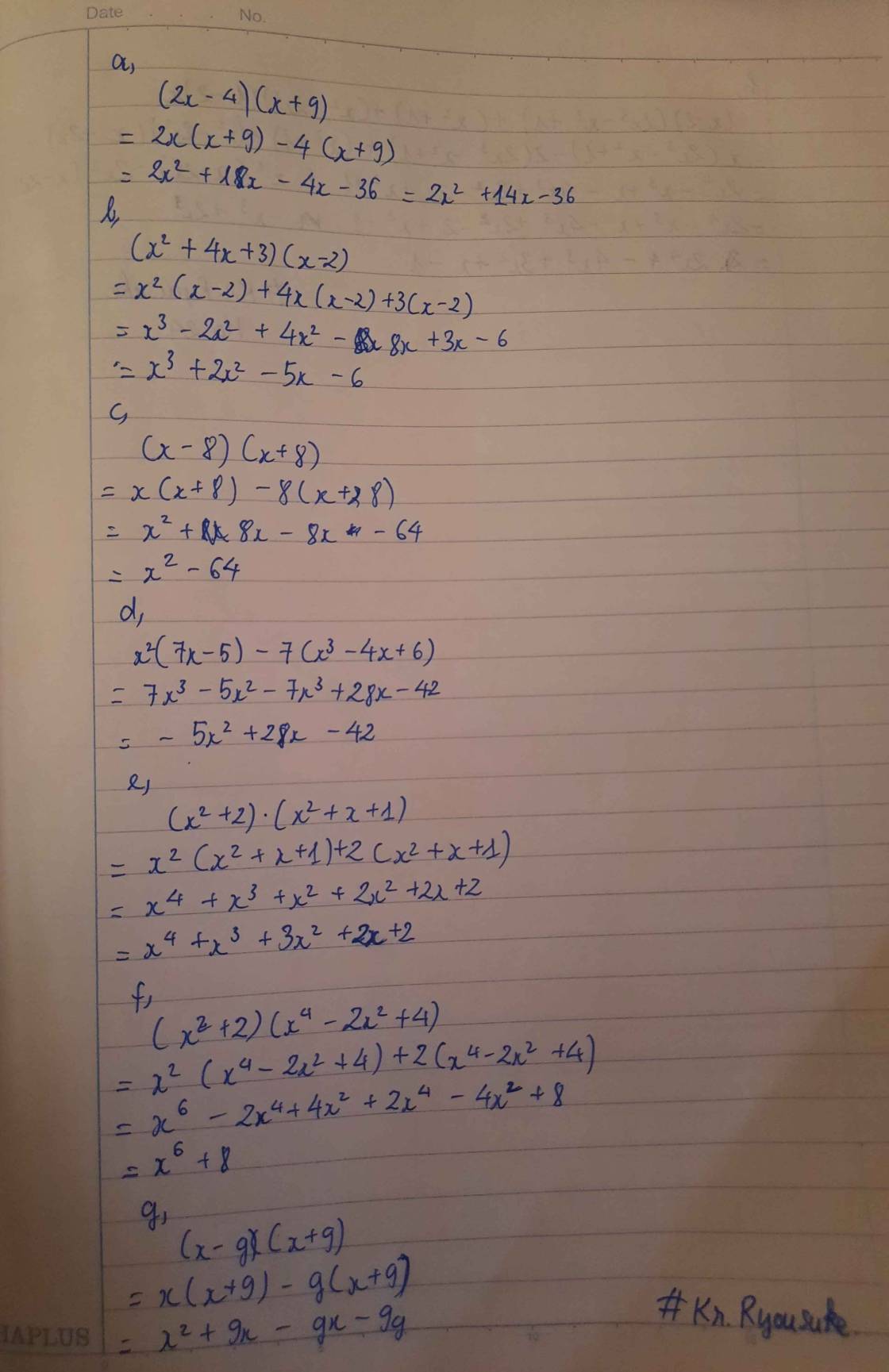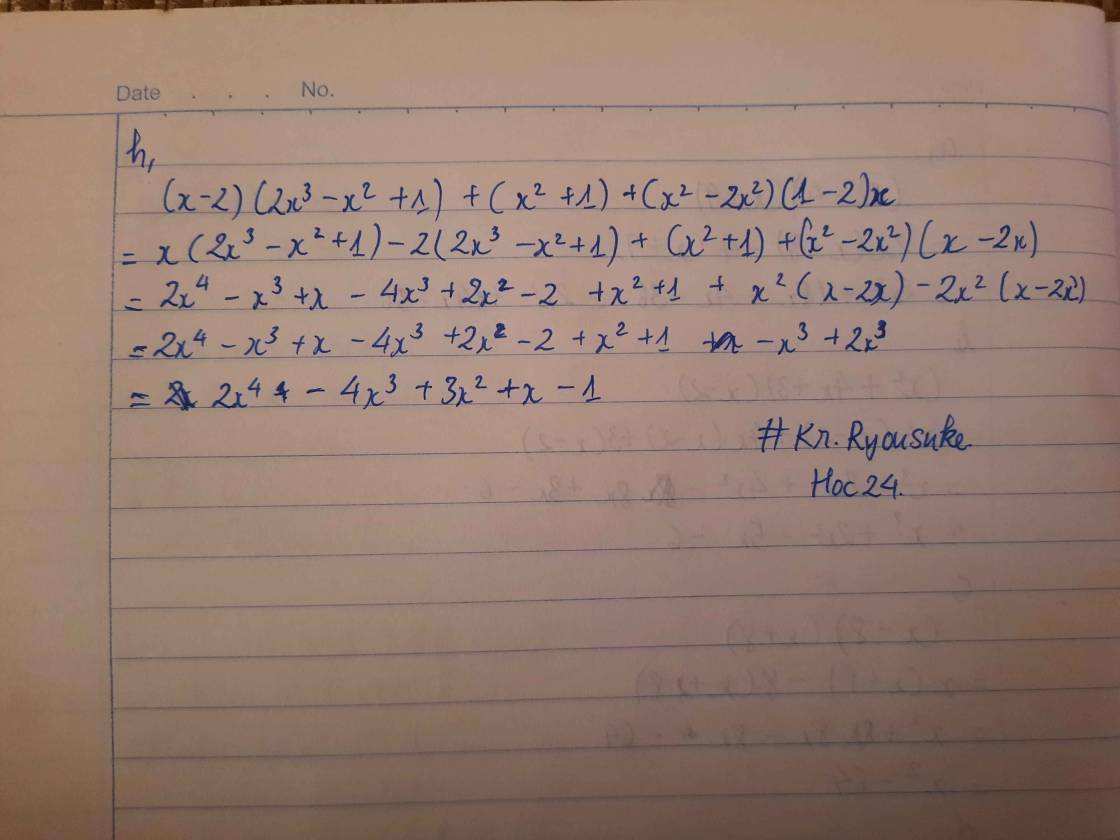Tìm x biết:(x+1).(x+2).(x+3)-x2(x+8)=27-2x2
NT
Những câu hỏi liên quan
Cho biểu thức P 1+ 3/x2+5x+6 : ( 8x2/ 4x3-8x2 - 3x/ 3x2-12 -1/x+2)A) Rút gọn PB) Tìm các giá trị của x để P 0; P 1C) Tìm cã giá trị của x để P 0Cho biểu thứcQ (2x-x2/ 2x2 +8 - 2x2/ 3x3-2x2+4x-8) (2/x2 + 1-x/x)A) Rút gọn QB) Tìm giá trị nguyên của x để Q có giá trị nguyên
Đọc tiếp
Cho biểu thức P= 1+ 3/x2+5x+6 : ( 8x2/ 4x3-8x2 - 3x/ 3x2-12 -1/x+2)
A) Rút gọn P
B) Tìm các giá trị của x để P= 0; P= 1
C) Tìm cã giá trị của x để P> 0
Cho biểu thức
Q= (2x-x2/ 2x2 +8 - 2x2/ 3x3-2x2+4x-8) (2/x2 + 1-x/x)
A) Rút gọn Q
B) Tìm giá trị nguyên của x để Q có giá trị nguyên
Bài 1:
a) Ta có: \(P=1+\dfrac{3}{x^2+5x+6}:\left(\dfrac{8x^2}{4x^3-8x^2}-\dfrac{3x}{3x^2-12}-\dfrac{1}{x+2}\right)\)
\(=1+\dfrac{3}{\left(x+2\right)\left(x+3\right)}:\left(\dfrac{8x^2}{4x^2\left(x-2\right)}-\dfrac{3x}{3\left(x-2\right)\left(x+2\right)}-\dfrac{1}{x+2}\right)\)
\(=1+\dfrac{3}{\left(x+2\right)\left(x+3\right)}:\left(\dfrac{4}{x-2}-\dfrac{x}{\left(x-2\right)\left(x+2\right)}-\dfrac{1}{x+2}\right)\)
\(=1+\dfrac{3}{\left(x+2\right)\left(x+3\right)}:\dfrac{4\left(x+2\right)-x-\left(x-2\right)}{\left(x-2\right)\left(x+2\right)}\)
\(=1+\dfrac{3}{\left(x+2\right)\left(x+3\right)}\cdot\dfrac{\left(x-2\right)\left(x+2\right)}{4x+8-x-x+2}\)
\(=1+3\cdot\dfrac{\left(x-2\right)}{\left(x+3\right)\left(2x+10\right)}\)
\(=1+\dfrac{3\left(x-2\right)}{\left(x+3\right)\left(2x+10\right)}\)
\(=\dfrac{\left(x+3\right)\left(2x+10\right)+3\left(x-2\right)}{\left(x+3\right)\left(2x+10\right)}\)
\(=\dfrac{2x^2+10x+6x+30+3x-6}{\left(x+3\right)\left(2x+10\right)}\)
\(=\dfrac{2x^2+19x-6}{\left(x+3\right)\left(2x+10\right)}\)
Đúng 0
Bình luận (0)
tìm x biết:
a, (x - 1)3 + (2 - x) (4 + 2x + x2) + 3x (x + 2) = 16
b, 8 (x - \(\dfrac{1}{2}\)) (x2 + \(\dfrac{1}{2}\)x + \(\dfrac{1}{4}\)) - 4x (1 - x - 2x2) = - 2
a: Ta có: \(\left(x-1\right)^3+\left(2-x\right)\left(4+2x+x^2\right)+3x\left(x+2\right)=16\)
\(\Leftrightarrow x^3-3x^2+3x-1+8-x^3+3x^2+6x=16\)
\(\Leftrightarrow9x+7=16\)
\(\Leftrightarrow9x=9\)
hay x=1
Đúng 0
Bình luận (0)
Thực hiện phép tính:
a,(2x- 4)(x+9)
b,(x2 + 4x +3)(x-2)
c,(x-8)(x+8)
d, x2(7x-5)-7(x3- 4x+6)
e,(x2+2)(x2+x+1)
f,(x2+2)(x4-2x2+4)
g,(x-g)(x+9)
h,(x-2)(2x3-x2+1)+(x2+1)+(x2-2x2)(1-2)x
Dễ
Thế
Mà
Cũnhoir
Dc
Ạ
Chịu
Chắc
Phải
Ngu
Lamqs
Mới
Hỏi
Câu
Này
Đúng 1
Bình luận (0)
Bài 3.Tìm x biết
b) 3x( x2 + 4) –2x2 -8 =0
a) x2+5x =0
c) (x-3) (x2 + 3x +9) +x( x+2) (2- x) =36
b) \(\Leftrightarrow3x^3+12x-2x^2-8=0\\ \Leftrightarrow\left(3x^3-2x^2\right)+\left(12x-8\right)=0\\ \Leftrightarrow x^2\left(3x-2\right)+4\left(3x-2\right)=0\\ \Leftrightarrow\left(x^2+4\right)\left(3x-2\right)=0\)
Vì \(x^2+4>0\Rightarrow3x-2=0\Rightarrow x=\dfrac{2}{3}\)
c) \(x^2+5x=0\\ \Leftrightarrow x\left(x+5\right)=0\\ \Leftrightarrow\left[{}\begin{matrix}x=0\\x=-5\end{matrix}\right.\)
d) \(\Leftrightarrow x^3-27+x\left(4-x^2\right)=36\\ \Leftrightarrow x^3+4x-x^3=63\\ \Leftrightarrow4x=63\\ \Leftrightarrow x=\dfrac{63}{4}\)
Đúng 1
Bình luận (0)
b) 3x(x\(^3\) +12x-2x\(^2\)-8=0
3x(x\(^2\)+4)-2(x\(^2\)+4)=0
(x\(^2\)+4)(3x-2)=0
\(\Leftrightarrow\left[{}\begin{matrix}X^2+4=0\\3X-2=0\end{matrix}\right.\) <=> \(\left[{}\begin{matrix}x\in Z\\X=\dfrac{2}{3}\end{matrix}\right.\)
a) x\(^2\)+5x=0
x(x+5)=0
\(\Leftrightarrow\left[{}\begin{matrix}x=0\\x+5=0\end{matrix}\right.\) \(\Leftrightarrow\left[{}\begin{matrix}x=0\\x=-5\end{matrix}\right.\)
c)(x-3)(x\(^2\)+3x+9)+x(x+2)(2-x)=36
x\(^3\)-27+x(x+2)(2-x)=36
4x-27=36
4x=36+27
4x=63
x=\(\dfrac{63}{4}\)
Đúng 1
Bình luận (0)
1) tìm giá trị nhỏ nhất của
D= 4x-x2+3
E=2x-2x2-5
F=-x2-4x+20
2) chứng minh biểu thức không phụ vào biến
A= (2x+3)(4x2-6x+9)-2(4x3-1)
B=(x+3)3-(x+9)(x2+27)
1. Đề bài sai, các biểu thức này chỉ có giá trị lớn nhất, không có giá trị nhỏ nhất
2.
\(A=\left(2x\right)^3-3^3-\left(8x^3+2\right)\)
\(=8x^3-27-8x^3-2\)
\(=-29\)
\(B=x^3+9x^2+27x+27-\left(x^3+9x^2+27x+243\right)\)
\(=27-243=-216\)
Đúng 2
Bình luận (0)
sửa đề lại thành tìm Max nhé1, vì mấy ý này ko có min
\(1,=>D=-\left(x^2-4x-3\right)=-\left(x^2-2.2x+4-7\right)\)
\(=-[\left(x-2\right)^2-7]=-\left(x-2\right)^2+7\le7\)
dấu"=" xảy ra<=>x=2
2, \(E=-2\left(x^2-x+\dfrac{5}{2}\right)=-2[x^2-2.\dfrac{1}{2}x+\dfrac{1}{4}+\dfrac{9}{4}]\)
\(=-2[\left(x-\dfrac{1}{2}\right)^2+\dfrac{9}{4}]\le-\dfrac{9}{2}\) dấu"=" xảy ra<=>x=1/2
3, \(F=-\left(x^2+4x-20\right)=-\left(x^2+2.2x+4-24\right)\)
\(=-[\left(x+2\right)^2-24]\le24\) dấu"=" xảy ra<=>x=-2
Đúng 2
Bình luận (0)
Bài 1:
a) Ta có: \(D=-x^2+4x+3\)
\(=-\left(x^2-4x-3\right)\)
\(=-\left(x^2-4x+4-7\right)\)
\(=-\left(x-2\right)^2+7\le7\forall x\)
Dấu '=' xảy ra khi x=2
c) Ta có: \(F=-x^2-4x+20\)
\(=-\left(x^2+4x-20\right)\)
\(=-\left(x^2+4x+4-24\right)\)
\(=-\left(x+2\right)^2+24\le24\forall x\)
Dấu '=' xảy ra khi x=-2
Đúng 0
Bình luận (0)
Xem thêm câu trả lời
1. Cho f(x)= x3 - 2x2 + 3x + 1; g(x)+ x3 + x - 1; h(x)= 2x2 -1
a) Tính f(x) - g(x) + h(x)
b) Tìm x sao cho f(x) - g(x) + h(x) = 0
2. Tìm nghiệm của
a) 5x + 3 (3x + 7) - 35
b) x2 + 8x - (x2 + 7x + 8) - 9
3. Tìm f(x) = x3 + 4x2 - 3x + 2; g(x) = x2 (x+4) + x - 5
Tìm x sao cho f(x) = g(x)
4. Tìm m sao cho k(x)= mx2 - 2x + 4 có nghiệm là -2
Tìm x
a) x2(x+1)+x+1=0
b) x2-x=-2x2+2x
c) 2x2(x-1)+x2=x
d) (x-2)(x2+4)=x2-2x
a) Ta có: \(x^2\left(x+1\right)+x+1=0\)
\(\Leftrightarrow\left(x+1\right)\left(x^2+1\right)=0\)
\(\Leftrightarrow x+1=0\)
hay x=-1
b) Ta có: \(x^2-x=-2x^2+2x\)
\(\Leftrightarrow3x^2-3x=0\)
\(\Leftrightarrow3x\left(x-1\right)=0\)
\(\Leftrightarrow\left[{}\begin{matrix}x=0\\x=1\end{matrix}\right.\)
c) Ta có: \(2x^2\left(x-1\right)+x^2=x\)
\(\Leftrightarrow2x^2\left(x-1\right)+x^2-x=0\)
\(\Leftrightarrow2x^2\left(x-1\right)+x\left(x-1\right)=0\)
\(\Leftrightarrow x\left(x-1\right)\cdot\left(2x+1\right)=0\)
\(\Leftrightarrow\left[{}\begin{matrix}x=0\\x=1\\x=\dfrac{-1}{2}\end{matrix}\right.\)
d) Ta có: \(\left(x-2\right)\left(x^2+4\right)=x^2-2x\)
\(\Leftrightarrow\left(x-2\right)\left(x^2+4\right)-x\left(x-2\right)=0\)
\(\Leftrightarrow\left(x-2\right)\left(x^2-x+4\right)=0\)
\(\Leftrightarrow x-2=0\)
hay x=2
Đúng 2
Bình luận (0)
cong phan thuc
a)x2+2/x2+4+5/x+2
b)x+y/2+x+2/2x2+4
c)8/(x2+3)(x2-1)+2/x2+3+1/X+1
c: \(=\dfrac{8}{\left(x^2+3\right)\left(x-1\right)\left(x+1\right)}+\dfrac{2x^2-2}{\left(x^2+3\right)\left(x-1\right)\left(x+1\right)}+\dfrac{\left(x^2+3\right)\left(x-1\right)}{\left(x^2+3\right)\left(x-1\right)\left(x+1\right)}\)
\(=\dfrac{1}{x-1}\)
Đúng 0
Bình luận (0)
Bài 1: Rút gọn rồi tính giá trị biểu thức:a) A 4x2.(-3x2 + 1) + 6x2.( 2x2 – 1) + x2 khi x -1b) B x2.(-2y3 – 2y2 + 1) – 2y2.(x2y + x2) khi x 0,5 và y -1/2Bài 2: Tìm x, biết:a) 2(5x - 8) – 3(4x – 5) 4(3x – 4) +11b) 2x(6x – 2x2) + 3x2(x – 4) 8c) (2x)2(4x – 2) – (x3 – 8x2) 15Bài 3: Chứng tỏ rằng giá trị của biểu thức sau không phụ thuộc vào giá trị của biến x:P x(2x + 1) – x2(x+2) + x3 – x +3
Đọc tiếp
Bài 1: Rút gọn rồi tính giá trị biểu thức:
a) A = 4x2.(-3x2 + 1) + 6x2.( 2x2 – 1) + x2 khi x = -1
b) B = x2.(-2y3 – 2y2 + 1) – 2y2.(x2y + x2) khi x = 0,5 và y = -1/2
Bài 2: Tìm x, biết:
a) 2(5x - 8) – 3(4x – 5) = 4(3x – 4) +11
b) 2x(6x – 2x2) + 3x2(x – 4) = 8
c) (2x)2(4x – 2) – (x3 – 8x2) = 15
Bài 3: Chứng tỏ rằng giá trị của biểu thức sau không phụ thuộc vào giá trị của biến x:
P = x(2x + 1) – x2(x+2) + x3 – x +3
\(1,\\ a,A=4x^2\left(-3x^2+1\right)+6x^2\left(2x^2-1\right)+x^2\\ A=-12x^4+4x^2+12x^2-6x^2+x^2=-x^2=-\left(-1\right)^2=-1\\ b,B=x^2\left(-2y^3-2y^2+1\right)-2y^2\left(x^2y+x^2\right)\\ B=-2x^2y^3-2x^2y^2+x^2-2x^2y^3-2x^2y^2\\ B=-4x^2y^3-4x^2y^2+x^2\\ B=-4\left(0,5\right)^2\left(-\dfrac{1}{2}\right)^3-4\left(0,5\right)^2\left(-\dfrac{1}{2}\right)^2+\left(0,5\right)^2\\ B=\dfrac{1}{8}-\dfrac{1}{4}+\dfrac{1}{4}=\dfrac{1}{8}\)
Đúng 3
Bình luận (0)
\(2,\\ a,\Leftrightarrow10x-16-12x+15=12x-16+11\\ \Leftrightarrow-14x=-4\\ \Leftrightarrow x=\dfrac{2}{7}\\ b,\Leftrightarrow12x^2-4x^3+3x^3-12x^2=8\\ \Leftrightarrow-x^3=8=-2^3\\ \Leftrightarrow x=2\\ c,\Leftrightarrow4x^2\left(4x-2\right)-x^3+8x^2=15\\ \Leftrightarrow16x^3-8x^2-x^3+8x^2=15\\ \Leftrightarrow15x^3=15\\ \Leftrightarrow x^3=1\Leftrightarrow x=1\)
Đúng 3
Bình luận (0)
\(P=x\left(2x+1\right)-x^2\left(x+2\right)+x^3-x+3\\ P=2x^2+x-x^3-2x^2+x^3-x+3\\ P=3\left(đfcm\right)\)
Đúng 2
Bình luận (0)
Xem thêm câu trả lời
Bài 5: Biết :
a. 3x + 2( 5 - x ) = 0
b. 2x( x + 3 ) + 2( x + 3 ) = 0
Giá trị của x cần tìm là ?
Bài 6: Rút gọn biểu thức:
A = 2x2(-3x3 + 2x2 + x - 1) + 2x(x2 – 3x + 1) giúp mik nhanh dc ko







